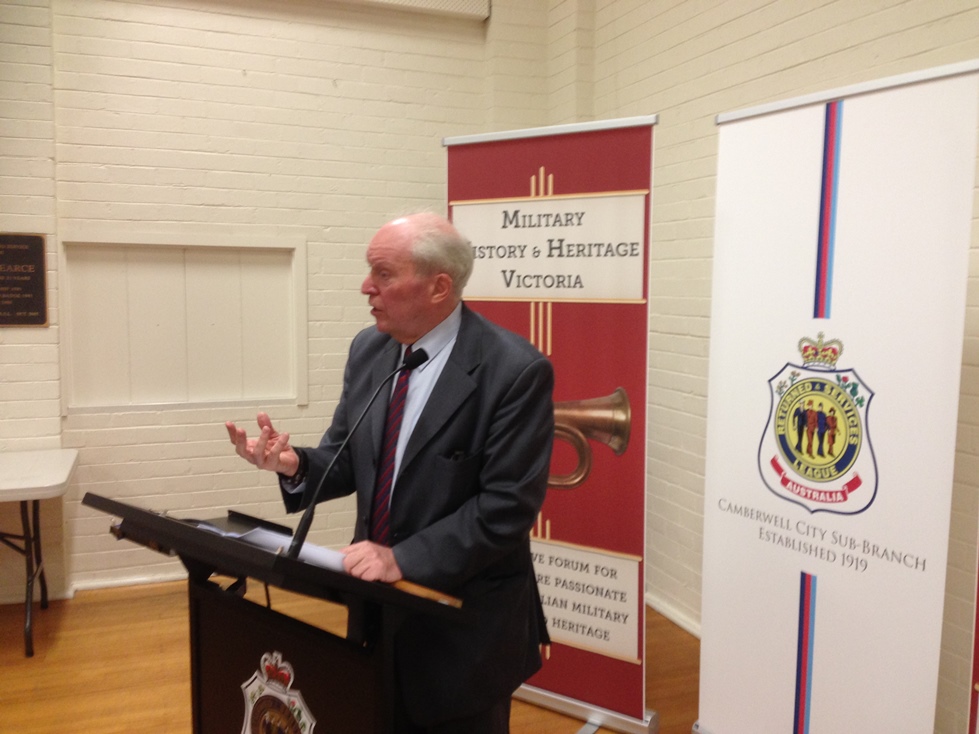The Pompey Elliott Memorial Hall was filled to capacity on Wednesday October 25 2017 as Professor Perry addressed a rapt audience of 80.

Perry told the story of the emergence and dominance of these brilliant Australian soldiers and how Australia’s two greatest generals changed the course of the Great War. Monash and Chauval commanded the two most effective armies in defeating the Germans and the Turks in the Great War in the critical and deciding year of 1918.

One of the misnomas of the Great War was that Australia was ‘fighting above its weight.’ In fact, Monash’s 1st AIF was the biggest of 20 Allied Armies on the Western Front with 208,000 soldiers. He was a dedicated militia officer who worked assiduously at the profession of soldiering as well as at his two fold career of professional engineer and lawyer. It was a long climb to the top for this “fat cat” commander from Melbourne.
Well before the war Monash was formulating how he could coordinate a battle like a large orchestra or a building project. It paid off, for as he climbed slowly up the command ranks put more of his methods on show. He garnered more and more attention – particularly from the King who became his foremost proponent. The King’s patronage was well placed as Monash proved time and again with increasingly deadly (for the Germans) campaigns; campaigns that changed the course of the war on the Western Front and gave German commander Ludendorff severe mental anguish.
Unlike Monash Harry Chauvel was a permanent officer. He and his light horse were sent to Egypt and then on to Gallipoli without their horses. Off their horses, Gallipoli was even more a shock for these dismounted men than it was for the ordinary Digger. Monash attached himself to Chauvel from the start to ease their passage into the squalid dangerous life they experienced as they faced the Turks. Chauvel was grateful. While never close friends, Monash and Chauvel had a great deal of professional respect for each other.
Chauvel, like Monash was asked to go to the Western Front, but equivocated as there would not be a role for the horses – as at Gallipoli, the light horse without horses is infantry. He was sent instead to Egypt where Harry Chauvel’s Desert Mounted Column in the Middle East was 75 per cent Anzac and was a key component of the Battle of Beersheba. Perry reminded us that there were many others in that battle including a British infantry that had, earlier in the day, drawn a large number defending Turks away from their defensive line. Chauvel rates another earlier battle, that for Romani, as his most significant. It was the battle in which the Turks were beaten for the first time and thus changed the way the Turks thought of themselves and their enemy.
Such was Chauvel’s capability that the British commander Allenby came to rely on him.
Monash left the Army after the war and became involved in great works including promoting the War Memorial in Melbourne and establishing the State Electricity Commission. Perry explained that the integrity of the written record of the Great War was badly distorted regarding Monash, largely due to the biases of Australian historian Charles Bean.
Chauvel on the other hand stayed in the Army and did sterling work keeping the force together.
The speech was followed by a lively 15 minutes of question time.

Roland Perry is a distinguished historian and author of a number of books on Australian military history including Monash: The Outsider Who Won a War and The Australian Light Horse. He won the prestigious Fellowship of Australian Writers National Literary Award for non-fiction (2004) with Monash.
In October 2011 Perry was made a Fellow of Monash University. He was awarded the Medal of the Order of Australia ‘for service to literature as an author’ in June 2011. Monash University bestowed a Professorship on Roland Perry in October 2012. He is the University’s first Writer-in-Residence, lecturing PhDs and PhD aspirants on all aspects of writing, and Australian history.
Contact Brent D Taylor about this article.






